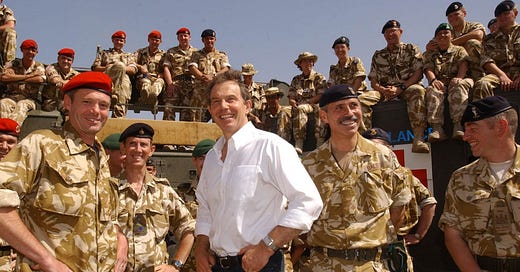‘The size and composition of a UK military contribution to the US-led invasion of Iraq was largely discretionary. The US wanted some UK capabilities (including Special Forces), to use UK bases, and the involvement of the UK military to avoid the perception of unilateral US military action. The primary impetus to maximise the size of the UK contribution and the recommendations on its composition came from the Armed Forces, with the agreement of Mr Hoon.’
This is the second of three posts to mark the 20th anniversary of the start of the Iraq War on 19 March 2003. In the first post I looked at the role of intelligence assessments. In the next post I will assess Tony Blair’s decision to support Bush. In this post I consider the reason why the UK’s military commitment took the form it did.
This is an issue that has attracted little controversy, certainly compared with the intelligence or legal issues. From early 2002 it was apparent that Blair supported George W Bush’s objective of removing Saddam Hussein from power in Iraq, while being keen to offer strategic advice on how this might be done, and so it was natural that he backed this with a significant military contribution. Yet it was the armed forces that pushed for a large contribution. When at one point it seemed that the UK role would largely be confined to the air and sea assets already in the Middle East Blair was not too worried. He only signed off on this larger contribution in late October 2002 because the Ministry of Defence told him that if he did not commit then the Americans would assume that no land contribution would be forthcoming. This was done on an assumption that the Americans could best be supported by a UK deployment to Turkey to fix Iraqi forces in the north. In January 2003 a new role was found, involving a deployment to Kuwait to be part of the main invasion force, an option that had been deemed impractical the previous summer.
When discussing the intelligence assessments in my last post I noted that the government had failed to ask the right questions. Instead of requiring the Joint Intelligence Committee to consider how confident it really could be in its assessment of Iraqi Weapons of Mass destruction it encouraged it to provide a confident version for public consumption. Something similar happened with the military advice. There was little discussion around alternative options and their potential implications for what might follow Saddam’s overthrow. The advice was strongly influenced by the military’s institutional preference for the maximum role in the main war combined with a minimal role in the aftermath. This preference was not surprising. Unfortunately insufficient questioning of the credibility of the assumptions underpinning it led to a situation in which the military became stuck in Iraq with a long-term commitment which they had wanted to avoid and for which they were unprepared.
Keep reading with a 7-day free trial
Subscribe to Comment is Freed to keep reading this post and get 7 days of free access to the full post archives.




